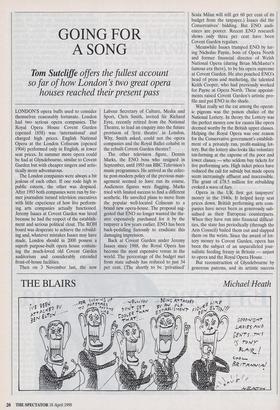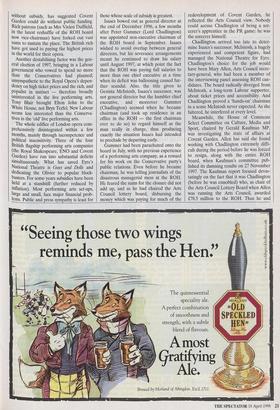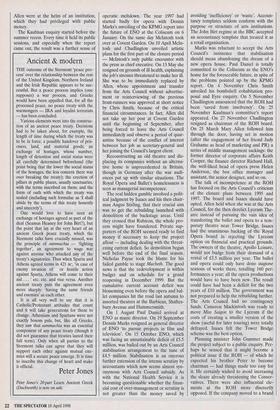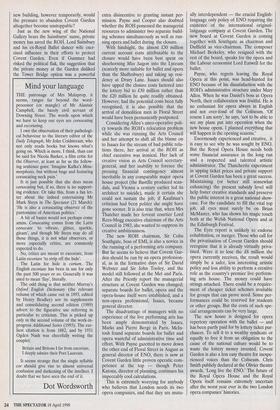GOING FOR A SONG
Tom Sutcliffe offers the fullest account
so far of how London's two great opera houses reached their present pass
LONDON'S opera buffs used to consider themselves reasonably fortunate. London had two serious opera companies. The Royal Opera House Covent Garden (opened 1858) was 'international' and charged high prices. English National Opera at the London Coliseum (opened 1904) performed only in English, at lower seat prices. In summer more opera could be had at Glyndebourne, similar to Covent Garden but with cheaper singers and artis- tically more adventurous.
The London companies were always a bit jealous of each other. If one rode high in public esteem, the other was despised. After 1993 both companies were run by for- mer journalists turned television executives with little experience of how live perform- ing arts companies actually functioned. Jeremy Isaacs at Covent Garden was hired because he had the respect of the establish- ment and serious political clout. The ROH board was desperate to achieve the rebuild- ing and, whatever mistakes Isaacs may have made, London should in 2000 possess a superb purpose-built opera house contain- ing the much-loved old Covent Garden auditorium and considerably extended front-of-house facilities.
Then on 3 November last, the new Labour Secretary of Culture, Media and Sport, Chris Smith, invited Sir Richard Eyre, recently retired from the National Theatre, to lead an enquiry into the future provision of 'lyric theatre' in London. Why, Smith asked, could not the opera companies and the Royal Ballet cohabit in the rebuilt Covent Garden theatre?
The other television figure, Dennis Marks, the ENO boss who resigned in September, until 1993 ran BBC Television's music programmes. He arrived as the eclec- tic post-modern policy of the previous man- agement seemed to have run its course. Audiences figures were flagging. Marks tried with limited success to find a different aesthetic. He unveiled plans to move from the popular well-located Coliseum to a brand new opera-house. The proposal sug- gested that ENO no longer wanted the the- atre expensively purchased for it by the taxpayer a few years earlier. ENO has been back-pedalling furiously to eradicate this damaging impression.
Back at Covent Garden under Jeremy Isaacs since 1988, the Royal Opera has become the most expensive venue in the world. The percentage of the budget met from state subsidy has reduced to just 34 per cent. (The shortly to be 'privatised' Scala Milan will still get 60 per cent of its budget from the taxpayer.) Isaacs did the Conservatives' bidding. But ENO audi- ences are poorer. Recent ENO research shows only three per cent have been Covent Garden regulars.
Meanwhile Isaacs trumped ENO by lur- ing Nicholas Payne, boss of Opera North and former financial director of Welsh National Opera (during Brian McMaster's famous era there), to be his opera supremo at Covent Garden. He also poached ENO's head of press and marketing, the talented Keith Cooper, who had previously worked for Payne at Opera North. These appoint- ments raised Covent Garden's artistic pro- file and put ENO in the shade.
What really set the cat among the operat- ic pigeons was the poison chalice of the National Lottery. In theory the Lottery was the perfect money cow for causes like opera deemed worthy by the British upper classes. Helping the Royal Opera was one reason for the Conservative government's establish- ment of a privately run, profit-making lot- tery. But the lottery also looks like voluntary tax-farming at the expense of the poor and lower classes — who seldom buy tickets for live performing arts. High ticket prices have reduced the call for subsidy but made opera seem increasingly affluent and inaccessible. The grant of £78.5 million for rebuilding evoked a wave of fury.
Opera in the UK first got taxpayers' money in the 1940s. It helped keep seat prices down. British performing arts com- panies have never been as generously sub- sidised as their European counterparts. When they have run into financial difficul- ties, the state has periodically (through the Arts Council) bailed them out and slapped them on the wrists. Since the award of lot- tery money to Covent Garden, opera has been the subject of an unparalleled jour- nalistic feeding frenzy in Britain — unjust to opera and the Royal Opera House.
But reconstruction of Glyndebourne by generous patrons, and its artistic success without subsidy, has suggested Covent Garden could do without public funding. Rich patrons (such as Mrs Vivien Duffield, in the latest reshuffle of the ROH board now vice-chairman) have forked out vast sums to sustain the place. The British rich have got used to paying the highest prices in the world for their opera.
Another destabilising factor was the gen- eral election of 1997, bringing in a Labour government who vowed to spend no more than the Conservatives had planned; unsympathetic to the Royal Opera's depen- dency on high ticket prices and the rich, and populist in instinct — therefore broadly uninterested in the live performing arts. Tony Blair brought Elton John to the White House, not Bryn Terfel. New Labour seems less interested than the Conserva- tives in the 'old' live performing arts.
The whole edifice of London opera com- prehensively disintegrated within a few months, mainly through incompetence and political insensitivity. Three of the four British flagship performing arts companies (the Royal Shakespeare, ENO and Covent Garden) have run into substantial deficits simultaneously. What has saved Eyre's National Theatre is Guys and Dolls and dedicating the Olivier to popular block- busters. For some years subsidies have been held at a standstill (further reduced by inflation). Most performing arts set-ups, large and small, face major financial prob- lems. Public and press sympathy is least for those whose scale of subsidy is greatest.
Isaacs bowed out as general director at the end of December 1996, a few months after Peter Gummer (Lord Chadlington) was appointed non-executive chairman of the ROH board in September. Isaacs wished to avoid overlap between general directors, but his severance arrangements meant he continued to draw his salary until August 1997, at which point the fact that the ROH was paying full salaries to more than one chief executive at a time when its deficit was ballooning caused fur- ther scandal. Also, the title given to Genista McIntosh, Isaacs's successor, was not general director but the humbler chief executive, and moreover Gummer (Chadlington) seemed when he became chairman (and took up residence in an office in the ROH — the first chairman ever to do so) to regard himself as the man really in charge, thus producing exactly the situation Isaacs had intended to preclude by departing early.
Gummer had been parachuted onto the board in July, with no previous experience of a performing arts company, as a reward for his work on the Conservative party's public relations. Even before he became chairman, he was telling journalists of the disastrous managerial mess at the ROH. He feared the sums for the closure did not add up, and as he had chaired the Arts Council lottery board, disbursing the money which was paying for much of the redevelopment of Covent Garden, he reflected the Arts Council view. Nobody Could accuse Chadlington of being a sor- cerer's apprentice in the PR game: he was the sorcerer himself.
Chadlington arrived too late to deter- mine Isaacs's successor. McIntosh, a hugely experienced and competent figure, had managed the National Theatre for Eyre. Chadlington's choice for the job would have been Mary Allen, Arts Council secre- tary-general, who had been a member of the interviewing panel assessing ROH can- didates. The board radically diverged from McIntosh, a long-term Labour supporter, about ticket prices and accessibility. And Chadlington proved a 'hands-on' chairman in a sense McIntosh never expected. As she faltered, he interfered at every level.
Meanwhile, the House of Commons Select Committee on Culture, Media and Sport, chaired by Gerald Kaufman MP, was investigating the state of affairs at Covent Garden. Allen has said she found working with Chadlington extremely diffi- cult during the period before he was forced to resign, along with the entire ROH board, when Kaufman's committee pub- lished its damning results on 27 November 1997. The Kaufman report focused devas- tatingly on the fact that it was Chadlington (before he was ennobled) who, as chair of the Arts Council Lottery Board when Allen was running the Arts Council, awarded £78.5 million to the ROH. Thus he and Allen were at the helm of an institution, which they had privileged with public money.
The Kaufman enquiry started before the summer recess. Every time it held its public sessions, and especially when the report came out, the result was a further sense of operatic meltdown. The year 1997 had started badly for opera with Dennis Marks's unveiling of the KPMG report into the future of ENO at the Coliseum on 6 January. On the same day McIntosh took over at Covent Garden. On 10 April McIn- tosh and Chadlington unveiled artistic plans for the first part of the closure period — McIntosh's only public encounter with the press as chief executive. On 13 May she resigned on grounds of ill health, explaining the job's stresses threatened to make her ill. She was to be immediately replaced by Allen, whose appointment and transfer from the Arts Council without advertise- ment or reinterviewing of the previous front-runners was approved at short notice by Chris Smith, because of the critical financial circumstances. In fact, Allen did not take up her post at Covent Garden until the beginning of September, after being forced to leave the Arts Council immediately and observe a period of quar- antine because of the conflict of interest between her job as secretary-general and her joining the Council's largest client.
Reconstructing an old theatre and dis- placing its companies without an alterna- tive home is unprecedented in Britain, though in Germany after the war audi- ences put up with similar situations. The Royal Opera and Ballet's homelessness is seen as managerial incompetence.
The real hidden gamble involved a polit- ical judgment by Isaacs and his then chair- man Angus Stirling, that their crucial aim was to get the rebuilding launched with demolition of the backstage areas. Until they crossed that Rubicon, the whole pro- cess might have foundered. Private sup- porters of the ROH seemed ready to find money if necessary to keep the project afloat — including dealing with the threat- ening current deficit. So demolition began well before the end of the final season. Nicholas Payne took the blame for his failed gamble to stage Macbeth. The good news is that the redevelopment is within budget and on schedule for a grand reopening in December 1999. But the cumulative current account deficit was blossoming even before the opera and bal- let companies hit the road last autumn to assorted theatres at the Barbican, Shaftes- bury Avenue and Hammersmith.
On 1 August Paul Daniel arrived at ENO as music director. On 19 September Dennis Marks resigned as general director of ENO `to pursue projects in film and television'. On 15 October ENO, which was facing an unsustainable deficit of £5.5 million, was bailed out by an Arts Council stabilisation arrangement to the tune of £4.5 million. Stabilisation is an onerous further extension of the intense scrutiny by accountants which now seems almost syn- onymous with Arts Council subsidy. As with the National Health Service it is becoming questionable whether the finan- cial cost of over-management or scrutiny is not greater than the money saved by avoiding 'inefficiency' or 'waste'. Accoun- tancy templates seldom conform with the purpose or structure of arts institutions. The John Hirt regime at the BBC accepted an accountancy template that treated it as a retail organisation.
Marks was reluctant to accept the Arts Council's insistence that stabilisation should mean abandoning the dream of a new opera house. Paul Daniel is totally committed to the Coliseum as the ENO's home for the foreseeable future, in spite of the problems pointed up by the KPMG report. On 4 November Chris Smith unveiled his bombshell cohabitation pro- posal and Eyre enquiry. On 5 November Chadlington announced that the ROH had been 'saved from insolvency'. On 25 November Kaufman's committee's report appeared. On 27 November Chadlington resigned as chairman of the ROH board. On 25 March Mary Allen followed him through the door, having set in motion (after the engagement of her friend Judy Grahame as head of marketing and PR) a series of middle management sackings: the former director of corporate affairs Keith Cooper, the finance director Richard Hall, the well-liked head of opera press Helen Anderson, the box office manager and assistant, the senior designer, and so on.
The talk of incompetence at the ROH has focused on the Arts Council's criticism of the closure plans between 1995 and 1997. The board and Isaacs should have opted, Allen held when she was at the Arts Council, for the then derelict Lyceum The- atre instead of pursuing the vain idea of transferring the ballet and opera to a tem- porary theatre near Tower Bridge. Isaacs had the unanimous backing of the Royal Opera board in rejecting the Lyceum option on financial and practical grounds. The owners of the theatre, Apollo Leisure, would not budge from their demand of a rental of £3.5 million per year. The ballet and opera could only have done stagione seasons of works there, totalling 160 per- formances a year; all the opera productions would have to have been new. The result could have had been a deficit for the two years of £10 million. The government was not prepared to help the rebuilding further. The Arts Council had no contingency funds. Cameron Mackintosh was ready to move Miss Saigon to the Lyceum if the costs of creating a smaller version of the show (useful for later touring) were totally defrayed. Isaacs felt the Tower Bridge scheme was the best option.
Planning minister John Gummer made the project subject to a public enquiry. Per- haps he sensed that it might become a political issue if the ROH — of which he expected his brother Peter to become chairman — had things made too easy for it. He certainly wished to avoid increasing the sleaze already threatening the Conser- vatives. There were also influential ele- ments at the ROH more discreetly opposed. If the company moved to a brand new building, however temporarily, would the pressure to abandon Covent Garden altogether become unstoppable?
Just as the new wing of the National Gallery bears the Sainsburys' name, private money has saved the ROH. Lord Sainsbury and his ex-Royal Ballet dancer wife exer- cised influence in their efforts to protect Covent Garden. Even if Gummer had risked the political flak, the suggestion that the private money at the Garden disliked the Tower Bridge option was a powerful extra disincentive to granting instant per- mission. Payne and Cooper also doubted whether the ROH possessed the managerial resources to administer two separate build- ing schemes simultaneously as well as run- ning opera and ballet during the closure.
With hindsight, the almost £30 million current account costs attributable to the closure would have been best spent on shoehorning Miss Saigon into the Lyceum (scarcely more suitable for ballet and opera than the Shaftesbury) and taking up resi- dency at Drury Lane. Isaacs should also have upped the closure costs factored into the lottery bid to £30 million rather than the £20 million he quite readily obtained. However, had the potential costs been fully recognised, it is also possible that the arrival of demolition men in Floral Street would have been permanently postponed.
Considering Allen's unto-operative poli- cy towards the ROH's relocation problem while she was running the Arts Council and her attempt to shift all the blame on to Isaacs for the stream of bad public rela- tions there, her arrival at the ROH as chief executive was ironical. Her lack of creative vision as Arts Council secretary- general, and her inability to foresee the pressing financial contingency almost inevitable in any comparable major opera house project (the Bastille produced scan- dals, and Vienna a century earlier led its architect to suicide), made it certain she could not sustain the job; if Kaufman's criticism had been politer she might have gone sooner. It is also true that, when Mrs Thatcher made her fervent courtier Lord Rees-Mogg executive chairman of the Arts Council in 1983, she wanted to suppress its creative ambitiousness.
The new ROH chairman, Sir Colin Southgate, boss of EMI, is also a novice in the running of a performing arts company. But he seems to believe that Covent Gar- den should be run by an opera profession- al, as in the formative days of Sir David Webster and Sir John Tooley, and the model still followed at the Met and Paris. After the Priestly report the managerial structure at Covent Garden was changed; separate boards for ballet, opera and the opera-house itself were established, and a non-opera professional, Isaacs, became general director.
The disadvantage of managers with no experience of the live performing arts has been amply demonstrated by Isaacs, Marks and Pierre Berge in Paris. McIn- tosh found separate boards for ballet and opera wasteful of administrative time and effort. With Payne gazetted to move down the other end of Floral Street in August as general director of ENO, there is now at Covent Garden little proven operatic com- petence at the top — though Peter Katona, director of planning, continues his impeccably cool calculations.
This is extremely worrying for anybody who believes that London needs its two opera companies, and that they are mutu- ally interdependent — the crucial English- language only policy of ENO requiring the existence of the international original- language company at Covent Garden. The new board at Covent Garden is coming together with Southgate as chairman and Duffield as vice-chairman. The composer Michael Berkeley, who resigned with the rest of the board, speaks for the opera and the Labour economist Lord Eatwell for the ballet.
Payne, who regrets leaving the Royal Opera at this point, was head-hunted for ENO because of his dissatisfaction with the ROH's administrative structure under Mary Allen. When he was Daniel's boss at Opera North, their collaboration was fruitful. He is no enthusiast for opera always in English and not over-fond of the Coliseum. 'Of course I am sorry', he says, 'not to be able to see my plans put into operation when the new house opens. I planned everything that will happen in the opening seasons.'
Enormously experienced and creative, it is easy to see why he was sought by ENO. But the Royal Opera House needs both some financial assurance in the long run and a respected and talented artistic administrator. The Thatcherite experiment in upping ticket prices and private support at Covent Garden has been a great success. Maintaining (or better still somewhat enhancing) the present subsidy level will help foster creative standards and preserve the public interest in a great national show- case. For the candidate to fill the vital top job, all eyes must surely be on Brian McMaster, who has shown his magic touch both at the Welsh National Opera and at the Edinburgh Festival.
The Eyre report is unlikely to endorse cohabitation, or merger. Those who call for the privatisation of Covent Garden should recognise that it is already virtually priva- tised. Were it to lose the £8 million the opera currently receives, the result would simply be a safer, less interesting artistic policy and less ability to perform a creative role as the country's premier live perform- ing arts house. The money could have strings attached. There could be a require- ment of cheaper ticket schemes available for groups that can prove need. Some per- formances could be reserved for students or other groups. But the costs of such spe- cial arrangements can be very large.
The new house is designed for opera repertory operation with the ballet — and has been partly paid for by lottery ticket pur- chasers. To sell it to a wealthy syndicate or equally to free it from an obligation to the cause of the national culture would be to waste the tottery money invested. Covent Garden is also a less easy theatre for inexpe- rienced voices than the Coliseum. Chris Smith publicly declared at the Olivier theatre awards, 'Long live the ENO.' The future of the Royal Opera House and the Royal Opera itself remains extremely uncertain after the worst year ever in the two London opera companies' histories.





























































 Previous page
Previous page